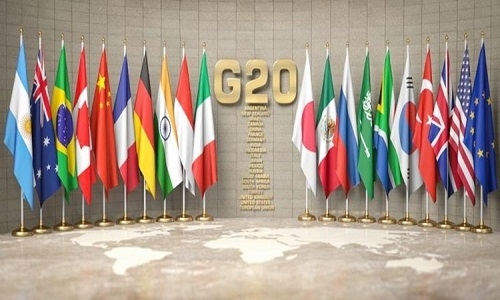‘Think 20’ must work for both India’s economic growth and security
| Date :25-Jan-2023 |

By D.C. PATHAK
ALL NATIONS endeavour to safeguard their security and economic interests - in that order - and this is what foreign policy is all about. Foreign policy, by definition, is a product of national security and economic concerns, and diplomacy provides the means for implementing it. In today’s world, diplomacy goes beyond ‘hospitality and smiles’ to demand ‘ideation’ that provides the intellectual strength to create a convergence in the face of differing stands and safeguard mutual interests in bilateral relations while handling the world affairs.
Think 20 (or T20), the forum of country’s top Think Tanks, is the prime instrument of India’s G20 Presidency for deliberating on ways and means of promoting the country’s growth as part of the world economy, enhancing India’s national security and elevating the country’s position as a major power in a multipolar world.
India is rightly taking up the issues of the South during its G20 Presidency. The situation in South Asia deserves a closer examination for the reason that in this India-centric region, the security environ has an overriding impact on its geopolitics. While the focus no doubt remains on economic cooperation, the challenge in the region is to effectively counter the dangerous forces threatening not only India’s security but the security of the democratic world at large.
The rise of faith-based militancy, primarily in the Pak-Afghan belt, has affected India the most as it is used by Pakistan for cross border terrorism against this country. What adds to India’s concerns is the fact that Sino-Pak axis - an alliance of a Marxist dictatorship and a fundamentalist regime - is working against India and has struck an unwritten pact with the Kabul Emirate led by Taliban-Al-Qaeda combine.
Faith-based militancy graduating into a force behind the call for Jehad on one hand and the Chinese aggressiveness on land and the marine front, on the other, have created a serious threat to the security of the countries spread across the vast stretch from West Asia to Indo-Pacific.
Terrorism is classically defined as resort to ‘covert’ violence for a perceived political ‘cause’. The ‘cause’ builds the motivation which may be ‘ideological’ as was the case with Naxalism or Maoism or could arise from assertion of ethnic identity as was witnessed in the insurgencies of the North East but the new global terror exploits the motivation of faith which in the case of Islam can be strong indeed.
In the Indian context, the threat of cross-border terrorism was pushed to a new pitch when Pakistan flush from the success of the anti-Soviet armed campaign in Afghanistan for which it got all the credit from the US-led West, planned to replicate the Afghan Jehad in Kashmir by not only doubling up the infiltration of Islamic militants of Hizbul Mujahideen and Jaishe Mohammad raised by it, besides the Saudi-funded Lashkare Toiba - who all had led the anti-Soviet Jehad in Afghanistan but additionally also inducting Taliban Mujahideen into the ‘proxy war’ against India.
Pakistan had used the Taliban for installing the Emirate at Kabul in 1996 and in spite of its felicitous role in the direct combat between Islamic radicals of Taliban-Al-Qaeda and the US during the subsequent ‘war on terror’ that started in Afghanistan, it managed to retain the goodwill of US by projecting itself as a mediator between Taliban and US for Doha talks and at the same time reinstall the Kabul Emirate of Taliban.
For India, the threat of terrorism has multiplied because of the new found capability of Pak ISI to set upon this country militants from across the Islamic spectrum- ranging from Hanafi HuM and the LeT of Ahle Hadis to the radical Wahabis of Taliban, Al-Qaeda and ISIS - the Al-Qaeda’s equivalent rising from the second theatre of ‘war on terror’ in Iraq-Syria belt. India’s security strategy has to take care of this aggravated threat.
India is seeing a new level of hostility from the Sino-Pak axis following the abrogation of Article 370 of the Constitution by the Indian Parliament and designation of Ladakh and Jammu & Kashmir as two Union Territories. There is complete collusion between these two hostile neighbours in conducting ‘covert’ offensives against India including use of drones in Kashmir and Punjab and stepping up criticism of India’s Kashmir policy internationally.
Prime Minister Modi has emerged as a global leader whose counsel on issues of war and peace as also on economic advancement of the world commands respect. This will go a long way in helping India to achieve the mission of G20 Presidency on various fronts. T20 has a major role in this - internationally and at home. It should give enough attention to the task of facilitating formulation of a comprehensive strategy of taking India economically forward in the face of serious security threats arising from its neighbourhood.
The sense of nationalism is a cultural concept that revolves round shared feelings of pride in secured boundaries, common view of the country’s friends and adversaries and partnership in carrying the nation forward towards a bright future. Communal politics was sustained by vested interests - Ulema and the communally-minded elite in the main - and this made it possible for outside forces to instigate communal militancy that would graduate into faith-based terror - as was illustrated by the emergence of Indian Mujahideen out of Students Islamic Movement of India (SIMI) in the North in the past, and the rise of the militant Islamic outfit called Popular Front of India (PFI) from Kerala recently. Both SIMI and PFI were banned after an exhaustive investigation. The T20 has a significant responsibility of studying some of the more important aspects of global security situation that had a bearing on India
and work in close cooperation with any R20 kind of forum formed under G20, to evolve the right Indian strategies for economic, environment, security, cultural and diplomatic matters.